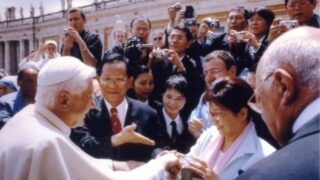French legal scholar Louis Renault was awarded the Nobel Peace Prize in 1907 after he served as arbitrator in a famous taxpayers’ rights case involving Japan.
by Massimo Introvigne*
*Conclusions of the webinar “Tai Ji Men: Testimonies of Peace and Justice,” co-organized by CESNUR and Human Rights Without Frontiers on September 21, 2023, United Nations International Day of Peace.


Today’s webinar has demonstrated, through papers and testimonies, that discriminating against minorities through the use of taxes is a threat to domestic and international peace.
In concluding the webinar, I would like to refer to a giant in the history of international law, including international tax law, who was awarded the Nobel Peace Prize for his contribution to world peace. His name was Louis Renault, and he should not be confused with the industrialist, also called Louis Renault, who was the main founder of the Renault car company. The two Louis Renaults were not related.
Italians may know Louis Renault, the jurist, because he shared the Nobel Peace Prize of 1907 with Italian Freemason and activist Ernesto Teodoro Moneta who, having fought with the private militia of Giuseppe Garibaldi during the war to unify Italy and witnessed the horror of the battles, eventually turned to radical pacifism.
Renault’s contributions to international law were outstanding, but when he won the Nobel Peace Prize he had just become famous as the main author of the arbitration award in the Japanese House Tax Case. At that time, it was believed that the award had avoided a war between Japan and a coalition consisting of the United Kingdom, France, and Germany.
As it happened to China, Japan had been imposed in the 19th century what Japanese historians call “unfair treaties” with Western powers, which compelled the Imperial government to sign them based on their superior military might. These treaties provided for areas in Japan where foreigners could live without being subject to Japanese laws and courts. The legal authority was represented there by the consuls of their countries. Opera fans know this situation from Puccini’s “Madame Butterfly.”


In a different international situation, the so-called unfair treaties signed with Japan between 1858 and 1869 were abolished in 1894. The full sovereignty on the previous foreign settlements under consular jurisdiction returned to Japan. There was, however, a problem concerning those foreign individuals who, based on the “unfair treaties,” had purchased homes in these settlements, often spending considerable money. They could not have done so in other areas of Japan, since Japanese law at that time prevented foreigners from owning real estate in the country. The 1894 treaties then stipulated that the rights of these homeowners would be preserved. Although as foreigners they could no longer be the owners of their homes, they kept them based on a perpetual lease from the government. They should pay a rental to Japan but no real estate taxes.
In the 20th century, however, Japanese tax authorities started claiming that the foreign perpetual lessees of properties in the former settlements should not pay taxes on the land but should pay taxes on the houses built on such land. The two taxes, on the land and on the buildings, were now different in Japanese tax law, and a Japanese homeowner should pay both. Apart from the unfairness of this double taxation, the foreign lessees objected that they were in a different position from the Japanese who owned a home. Firsts, as foreigners they could not become the owners of their homes, only the lessees. Second, they already paid a rent that was equivalent to the taxes or higher. These lessees were thousands, and enormous economic interests were at stake. While the United States counseled its citizens to pay the tax and avoid an international crisis, Germany, France, and the United Kingdom threatened Japan with retaliation, including military.
Happily, all the parties decided to resort to international arbitration under the 1898 Convention for the Pacific Settlement of International Disputes, and relied on Renault’s fame of integrity, although he was appointed by the three European countries as their arbitrator, as a guarantee that the college of arbitrators would render a fair decision. In the landmark 1905 ruling, Renault and the Norwegian arbitrator Gregers Gram (the former Prime Minister of Norway), with the Japanese member of the panel Itchiro Motono dissenting, decided against Japan. They concluded that when the 1894 treaties were signed nobody had in mind the possibility of a double taxation of the land and the buildings erected on that land, and that individual taxpayers should not suffer because of changes in international politics.


Renault, in particular, with his fine legal reasoning, was credited with having avoided a war on a tax issue and awarded the Nobel Peace Prize. Unfortunately, however, Japan refused to accept the award and continued to impose tax bills, although to avoid international retaliation the bills were not enforced and the foreign lessees continued to occupy their homes and to accumulate unpaid tax debt. The cases were settled only in 1937, but by then the tax case had poisoned Japan’s international relations and contributed to the climate that would lead to the country’s ill-fated involvement in World War II.
This was not Renault’s fault, though, and I believe the case confirms that greedy tax authorities are a threat for peace. In retrospect, while some Japanese and even Western scholars criticize Renault’s attitude as neo-colonialist, others point out that tax bureaucrats who did not see beyond their own and the tax office’s narrow interests prevailed upon the Japanese government and persuaded it to attack foreign taxpayers in a way that threatened international peace.


This is an important lesson for the Tai Ji Men case, and one that casts a shadow on the future of Taiwan. When corrupt tax bureaucrats are not controlled by governments but prevail upon politicians to blindly follow them, the international image of a country is compromised, and peace itself is in danger. May the International Day of Peace be an opportunity to meditate on the fact that there is no peace without tax justice, and there would be no peace for Taiwan without a solution of the Tai Ji Men case.









